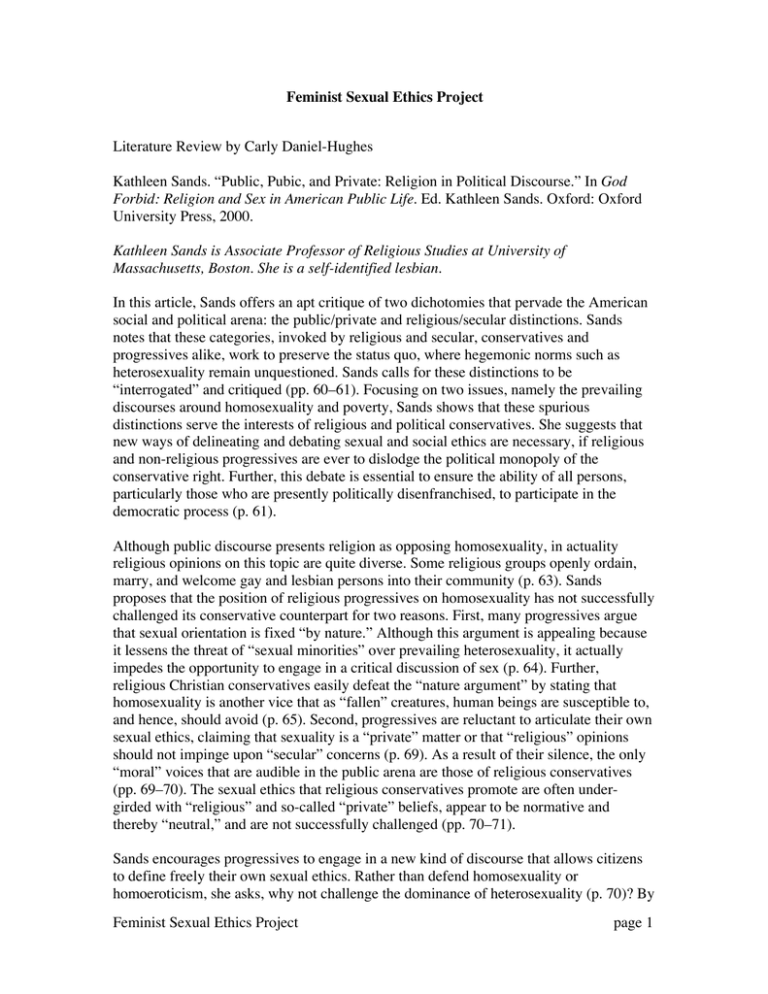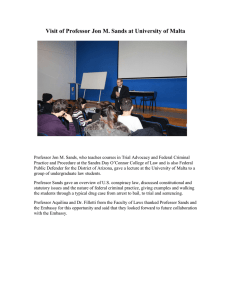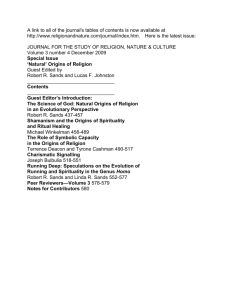
Feminist Sexual Ethics Project
Literature Review by Carly Daniel-Hughes
Kathleen Sands. “Public, Pubic, and Private: Religion in Political Discourse.” In God
Forbid: Religion and Sex in American Public Life. Ed. Kathleen Sands. Oxford: Oxford
University Press, 2000.
Kathleen Sands is Associate Professor of Religious Studies at University of
Massachusetts, Boston. She is a self-identified lesbian.
In this article, Sands offers an apt critique of two dichotomies that pervade the American
social and political arena: the public/private and religious/secular distinctions. Sands
notes that these categories, invoked by religious and secular, conservatives and
progressives alike, work to preserve the status quo, where hegemonic norms such as
heterosexuality remain unquestioned. Sands calls for these distinctions to be
“interrogated” and critiqued (pp. 60–61). Focusing on two issues, namely the prevailing
discourses around homosexuality and poverty, Sands shows that these spurious
distinctions serve the interests of religious and political conservatives. She suggests that
new ways of delineating and debating sexual and social ethics are necessary, if religious
and non-religious progressives are ever to dislodge the political monopoly of the
conservative right. Further, this debate is essential to ensure the ability of all persons,
particularly those who are presently politically disenfranchised, to participate in the
democratic process (p. 61).
Although public discourse presents religion as opposing homosexuality, in actuality
religious opinions on this topic are quite diverse. Some religious groups openly ordain,
marry, and welcome gay and lesbian persons into their community (p. 63). Sands
proposes that the position of religious progressives on homosexuality has not successfully
challenged its conservative counterpart for two reasons. First, many progressives argue
that sexual orientation is fixed “by nature.” Although this argument is appealing because
it lessens the threat of “sexual minorities” over prevailing heterosexuality, it actually
impedes the opportunity to engage in a critical discussion of sex (p. 64). Further,
religious Christian conservatives easily defeat the “nature argument” by stating that
homosexuality is another vice that as “fallen” creatures, human beings are susceptible to,
and hence, should avoid (p. 65). Second, progressives are reluctant to articulate their own
sexual ethics, claiming that sexuality is a “private” matter or that “religious” opinions
should not impinge upon “secular” concerns (p. 69). As a result of their silence, the only
“moral” voices that are audible in the public arena are those of religious conservatives
(pp. 69–70). The sexual ethics that religious conservatives promote are often undergirded with “religious” and so-called “private” beliefs, appear to be normative and
thereby “neutral,” and are not successfully challenged (pp. 70–71).
Sands encourages progressives to engage in a new kind of discourse that allows citizens
to define freely their own sexual ethics. Rather than defend homosexuality or
homoeroticism, she asks, why not challenge the dominance of heterosexuality (p. 70)? By
Feminist Sexual Ethics Project
page 1
abandoning the “nature argument,” homosexuality can be presented as a choice, and then
by extension, so can heterosexuality (pp. 66–67). Sands posits that this new kind of
discourse, where sexual diversity (heterosexual and homosexual, as well as monogamous
and non-monogamous relations) is emphasized, can highlight the ways that such variety
is in fact a social advantage (p. 69). Religious progressives, who “find good” in
homoeroticism, could point to its benefits. Sands offers the examples that homoerotic
relations can promote gender equality and that same-sex marriages can create families
that are economically stable (p. 69).
In this new discourse, where diversity is emphasized, individuals are truly free to
delineate an ethic that befits their well being. Sexual regulation, she adds, is only of
benefit when people have determined when and in what circumstances sexual behavior
impacts negatively on common public interests (p. 68). For instance, regulation should be
applied to protect against “harms that can be understood as violence.” Not that violence is
the sole possible harm of sex, but citizens have better means than regulation to exert
“ethical influence over each other,” especially when the mask of privacy and religion no
longer mar the public debate about sex (p. 68). “The right to sexual dissidence,” she
argues, should not be articulated as “freedom from religion,” but more akin to “freedom
of religion.” The right to delineate one’s sexual ethic is a “freedom of conscience,” just as
religion is a way of living and comprises a set of beliefs that are selected and become part
of one’s identity (p. 71). The ability to express dissent from conventional norms should
be protected just like the right to subscribe to and proclaim a particular religion. It should
not matter whether “sexual dissidents succeed in converting the world,” but whether their
voices are permitted into the public sphere, creating a public discourse that is less
coercive and more accurately represents the plethora of opinions regarding sex (pp.
72–73).
Sands addresses welfare reform as another example of the problematic discourse of sex in
American public life. She argues that the Personal Responsibility Act of 1996, a part of
welfare reform legislation, portrays poverty as a personal failing rather than as a societal
problem (pp. 73–74). The emphasis on illegitimacy moves the discourse from the societal
concern about poverty to one of sexual ethics (pp. 77–78). In this debate, the lives of poor
women fall under public scrutiny. They are living and raising children outside of the
“control and supervision of men,” considered, particularly for African-American women,
to “be socially intolerable” (p. 77). The Act presents marriage as “the foundation of
successful society” (p. 75). Yet consigning women to marriage and child rearing, under
the financial tutelage of a husband, effectively excludes their ability to participate in
public life (p. 77). Moreover, it does not take into account social realities: many women
are marrying later in life, leaving abusive marriages, or choosing to raise children in a
same-sex relationship (p. 78). Clearly the Religious Right champions the “male-headed”
nuclear household, but religious progressives should not uncritically emphasize family,
without articulating how this family has been historically represented (p. 79). A critical
analysis also requires drawing attention to the way child rearing limits the ability of
women to participate in the democratic process. Further, Sands adds, religion’s treatment
of the welfare debate often reads like orthodox Calvinism: one’s financial standing is
based on one’s “personal merit” (p. 80). Contributing to and assisting the financially
Feminist Sexual Ethics Project
page 2
needy then becomes an act of charity, an option and not a collective responsibility (p. 80).
Sands invites those progressives who work intimately with the poor to articulate how
poverty is not only a personal but also a societal concern. Ultimately, welfare debate
needs a social vision that respects the poor (pp. 74–75). Sands hopes that a changed
public landscape, where religious and non-religious progressives lucidly and continually
proclaim their own ethics alongside religious and non-religious conservatives, can protect
the rights of all citizens to engage in the public debate about sex and all matters of
common social interest.
http://www.brandeis.edu/projects/fse/
Feminist Sexual Ethics Project
page 3




